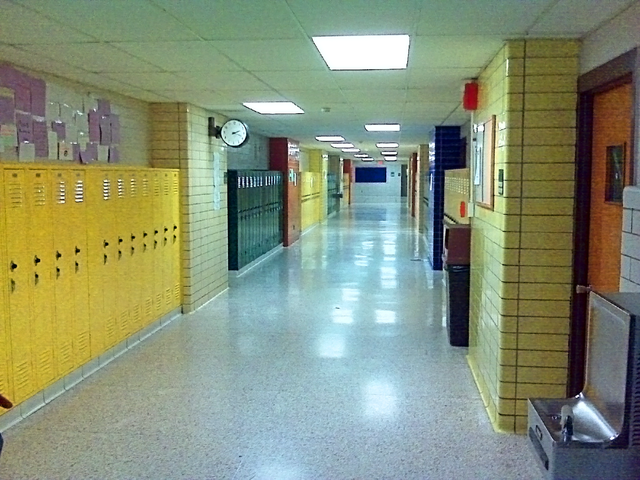
High school lockers in Langley, Virginia. Photograph by Elizabeth Murphy. Wikimedia Commons, licensed under CCO 2.0.
Of all the things I didn’t know when I was thirteen, two pained me the most: music and romance. I had no instrument, no boyfriend, no way of predicting, when I dared to accompany the radio in the car, if my note would match that note. Girls who could sing, I observed, had hookups and breakups, and, even better, the whispered hallway dramas that led from one to the other. I made certain inferences. And yet I didn’t see how to, well, join the chorus. A good ear is innate, isn’t it? You can unwrap a hundred Starbursts with your tongue and still know nothing of kissing. So I kept my crushes to myself. I stopped singing in the shower.
But ignorance is good for desire. I don’t doubt the subtle pleasures of connoisseurship, but can it compare to the transcendence of a teenager, luxuriating in her loneliness, who detects in the generic bridge of a Maroon 5 song a message for her alone? To the brief and sacred innocence in which I really, truly took it to heart: “She Will Be Loved”? Hard not to cringe for her, except that I envy her, too.
The lucky truth is that I still don’t know much. Not for lack of trying. My first real boyfriend had thousands of lyrics in his head. He made me playlists, as boyfriends often do. The Velvet Underground, A$AP Rocky, Tom Waits. Yo La Tengo. Later, I dated a drummer and learned (kind of) about jazz and samba, about Milford Graves, who transcribed heartbeats into music notation. An education of sorts, but who, in the end, wants to be schooled by love? These days, I play the Top 40 wherever I go. I turn up the volume. In the seat beside me, the person I love says, I thought you hated this song. And maybe I did! Every now and then, I sing, though not because I’ve conquered any fears or learned any lessons. Mostly, I still just listen.
Clare Sestanovich is the author of the story collection, Objects of Desire.
from The Paris Review https://ift.tt/OmlxKS9
Comments
Post a Comment